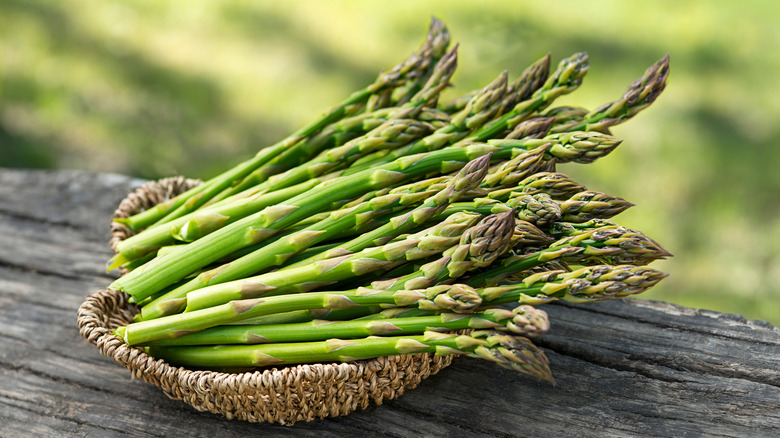How Does Asparagus Impact The Smell Of Your Pee?
If you're a Chris Evans or Jana Kramer fan, you may recall the bizarre (and embarrassing) "asparagus pee" story involving the pair, who dated briefly. The incident left many who don't indulge in the green veggie — and also some who do — wondering if eating asparagus does, in fact, change the smell of urine. WebMD confirms that it does, describing the odor as a sulfuric one. Some people compare it to the smell of rotten cabbage, as Healthline explains.
Although "asparagus pee" may be news to some, it's actually been written about for hundreds of years, including by one of our founding fathers. According to Inverse, Ben Franklin wrote a letter to the Royal Academy of Brussels in 1781 with the claim that "a few stems of asparagus eaten shall give our urine a disagreeable odor."
But how exactly does asparagus impact the smell of urine, and does everyone have the same reaction after eating the vegetable?
Asparagus pee is the result of a chemical reaction in the body
Asparagus contains a compound called asparagusic acid, which breaks down into carbon, hydrogen, oxygen, and sulfur when the body digests it, according to Chemistry World. These elements are called asparagus metabolites since they're created and released in urine during the metabolism process, as MedicalNewsToday explains.
Dr. Shane Bobart, a nephrologist, weighed in on the conversation in a Cleveland Clinic article and gave an explanation of how these metabolites affect urine. "When you pee, the sulfur byproducts evaporate almost immediately, causing you to smell that unpleasant scent," he said. The article adds that this foul odor can be smelled about 15 to 30 minutes after eating asparagus.
Wondering how long the sulfuric stench lasts? According to Healthline, a study revealed that it could last about nine hours while another study determined it could linger for as many as 14 hours in some people. So if you're at a dinner party with concerns about the odor, plan to use the ladies' room immediately after your meal, instead of waiting until you have to pee.
Does everyone's pee smell after eating asparagus?
It seems like a simple question, but the answer is a bit complex. Studies reveal that some people can smell "asparagus pee" while others can't, and Healthline claims there are two hypotheses for the reason. One involves being "noseblind" while the other involves the absence of the odor.
Let's take a closer look at the first hypothesis. "Noseblindness" can be thought of as layman's term for anosmia, which is the medical term for a complete loss of smell (via Mayo Clinic). People who can't "smell asparagus metabolites in their own urine as well as in others' urine are said to be asparagus anosmic," according to News-Medical Life Sciences. The results of a study published in MedicalNewsToday revealed that the ability to smell "asparagus pee" ultimately depends on your DNA.
The second hypothesis involves the absence of the odor in certain individuals. Referred to as "non-producers," Healthline claims these individuals "lack a key enzyme that helps metabolize asparagusic acid and are thus unable to produce the smelly byproducts." News-Medical Life Sciences suggests another possibility that if the urine of non-producers does create an odor, it's too faint to be detected.
To recap, "asparagus pee" is a smell that results from the metabolized asparagusic acid. But not everyone can detect it, either because they have asparagus anosmia or their urine doesn't produce the odor at all. Either way, the odor is a small price to pay to reap the benefits of this healthy vegetable.


